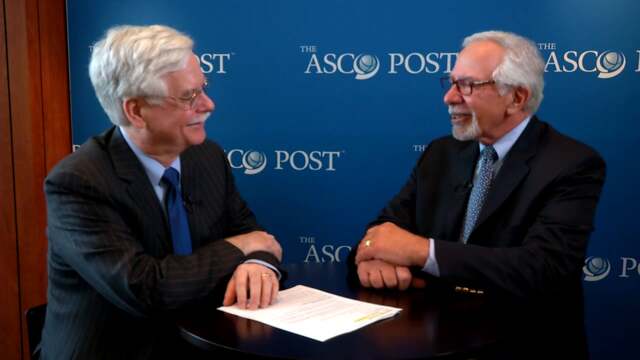Amy Cyr, MD on Advances in Management of Early-Stage Breast Cancer
2015 NCCN Annual Conference
Amy Cyr, MD, of the Siteman Cancer Center at Barnes-Jewish Hospital and Washington University School of Medicine, discusses advances made in the treatment of early-stage breast cancer: less radiation and a shorter course, the rising use of molecular profiling, and less invasive surgery and reduced amounts of surgery.
Jerald P. Radich, MD
Jerald P. Radich, MD, of the Fred Hutchinson Cancer Research Center and Seattle Cancer Care Alliance discusses the evolution in treating and monitoring CML and whether monitoring at 3 and 6 months will ultimately prove useful.
Rebecca H. Johnson, MD
Although guidelines worldwide mandate fertility preservation for newly diagnosed patients within their reproductive window, most patients are still not referred or offered this option. Rebecca H. Johnson, MD, of Mary Bridge Children’s Hospital, explains the steps that need to be taken when counseling patients.
Leora Horn, MD, MSc
Leora Horn, MD, MSc, of the Vanderbilt-Ingram Cancer Center, discusses the range of treatment options for people with lung cancer, including third generation inhibitors, and the key clinical trials studying alternatives for patients with acquired resistance.
Clifford Goodman, PhD, and Peter B. Bach, MD, MAPP
Clifford Goodman, PhD, of the The Lewin Group, and Peter B. Bach, MD, MAPP, of Memorial Sloan Kettering Cancer Center, discuss the affordability of cancer care, the “financial toxicities” of high drug prices, and what could and should be done about it.
Robert W. Carlson, MD, and John A. Gentile, Jr
Robert W. Carlson, MD, Chief Executive Officer, National Comprehensive Cancer Network, and John A. Gentile, Jr, Chairman, Harborside Press, LLC, discuss the early days of NCCN, controversies that surrounded the first meeting, oncologists’ embrace of the guidelines, and how the organization has evolved over the past 20 years.





